- Home
- Clive Barker
Sherlock Holmes and the Servants of Hell Page 2
Sherlock Holmes and the Servants of Hell Read online
Page 2
I do not think it would be an understatement to comment that when Holmes returned from his watery grave in the Spring of 1894 (the only way, I was gravely assured, for Holmes to rid the world of the evil Professor Moriarty) I found him to be a much changed man. Everything that occurred in the story ‘The Adventure of the Empty House’ happened more or less as I described it, although again Holmes would have me apologise for the way in which it was described – something I was, and remain, unwilling to do.
I had been making use of myself aiding the police wherever possible – in this instance regarding the suspicious death of the Honourable Ronald Adair, son of the Earl of Maynooth – when Holmes decided to reveal that he was still alive. He did this in typical theatrical fashion, by masquerading as a deformed book collector, then whipping off his disguise in my study – the shock of which on my part cannot be underestimated. His true self revealed, he then enlisted my help in capturing Moriarty’s man, the crack-shot Colonel Moran; one of the factors preventing my friend from letting me know he was still very much alive.
It was his misguided way of keeping me safe, I understood that – feelings did not come into the equation as far as he was concerned – but there is a part of me that will forever remain angry at Holmes for this deception, especially in light of what I found out during this particular case... or succession of cases, as it turned out to be. Perhaps if he had warned me that there were still agents of Moriarty’s on the prowl then –
But I digress. We captured Moran, by fooling him into thinking Holmes was at his window in Baker Street – when it was in fact a replica he’d had made – and the killer was promptly arrested. Even as the excitement died down, I could see something was different about my friend. He had always complained that without stimulus, without mysteries to solve – the kind of mysteries only he could solve, I should qualify – he soon grew bored. And when Holmes grew bored, it was usually only a matter of time before he took up his old habit of drug use, something I was forever attempting to dissuade him from with varying degrees of success.
However his penchant for his seven-percent solution of cocaine, administered via a needle he kept locked away in a polished Morocco box, was the least of my concerns after he returned, it transpired. Yes, there were conundrums to periodically keep him occupied between April ’94 and the winter of 1895, such as his efforts to recover a famous stone, solving the murder of a young secretary and keeping a music teacher safe. All worthy causes and written up more or less as they unfolded, aside from a few changes to the character of Holmes, the reasons for which will soon become apparent.
In fact, we had only just cracked the case of the ‘Bruce-Partington Plans’ when we would be called upon to help the first family – that we knew of then – to be affected by the hidden forces at work in our world. In our very city! But before we come to that, it is essential I paint a picture of Holmes’ state of mind at that time.
I wrote at the start of the Bruce-Partington affair that my friend was restless – even willing some criminal to take advantage of the thick fog that November in 1895 to commit an act that he might untangle. I confess I glossed over his mood in this respect.
You see, ever since the loss of Moriarty – the Napoleon of crime, responsible for countless interconnected unlawful and immoral deeds – Holmes had never really felt adequately challenged. It was as if he felt he’d reached his pinnacle with that struggle, and nothing afterwards was enough to fully engage him. The fact that he tackled all of the cases mentioned above, and more, when only partially invested in them, should tell you something about his abilities. For, in-between, he was distracted by another altogether more dangerous ‘hobby.’
I, myself, have to admit to being preoccupied at the time – still suffering, as I was, from grief after the passing of my sweetheart Mary. As you can imagine, after Holmes’ ‘death’, the loss of my wife, from a severe and virulent illness that yielded to neither diagnosis nor treatment, left me reeling. She slipped into a coma from which she would never wake, though I remained by her hospital bedside and prayed for her recovery – we never even got to say goodbye. There were some mornings during that time when I felt unable to even face the day, let alone any patients; I am afraid I let more than a few people down, and though they insisted that they understood, I was guilt-stricken for a long while afterwards. And though some even said they appreciated what I was going through, the pain I was enduring, I selfishly did not believe them – as if my own, personal hardships were any greater than other people’s. Much later, I would wonder what I was thinking, but I was far too close to it back then, too full of self-pity and Hell-bent on my own course of self-destruction.
I have always enjoyed a tipple and a bet or two, but both my drinking and my gambling got out of hand. If it had not been for the talking-to that Mrs Hudson gave me – a woman who had done such an incredible job of looking after me before Mary came along; looking after both Holmes and I, actually, God rest her soul – and for the police calling upon me from time to time to ask my opinion as a consultant, in lieu of Holmes’ expertise, I might well have fallen into a hole out of which I would never have been able to climb. As it was, the terrible dreams I kept having about Mary and her death still persisted, even after Holmes’ return; dreams that would often drift back into my time on the battlefield, the deaths of comrades and enemies alike blurring into one. Many’s the night I woke up in a cold sweat, crying out for these visions to cease.
It is because of this, I suspect, that I thought I might understand what Holmes himself was going through; though to compare the loss of a wife to an arch-enemy sounds strange, I know. Nevertheless, I felt sure that they were two sides of the same coin, Holmes and Moriarty. As brilliant as each other, they balanced things out: good and evil. So when one was taken away...
Holmes said that after he left me at the Falls he went travelling, first to Florence, then to Tibet, and then Lhasa. Subsequently, under the adopted name of a Norwegian explorer called Sigerson, he visited Persia, entered Mecca, and enjoyed a brief stopover in Khartoum. He would finally end up doing chemical research on coal tar derivatives in France. These are the simple facts I presented, but there was so much more to it than that, as I found out when Holmes – at various points while he was under the influence – let more details slip.
I’ll begin with Tibet, where Holmes told me he spent some time with the head Lama. Here my friend studied meditation and meditative states, in an effort to disconnect one’s body from the mind: to disassociate yourself from the world and achieve higher levels of consciousness. In theory, using techniques like this, Holmes confided to me once, it was even possible to visit different planes of existence, though I found that hard, if not impossible, to believe. I have seen some strange things in my time, however, not least regarding the affair which I am about to relate – but before this even, in my time abroad, especially in Africa and India; the latter where meditation and prayer definitely go hand-in-hand.
His intention, I can only assume, was to learn how to push his body to its limits, while transferring his mind to another place. Of course, I did not realise this until I bore witness to some of the experiments he put himself through upon his return. It started off small; I would catch him holding his hand over a flame, focussed and unflinching as the flesh burned and cooked. Upon noticing me, he would sheepishly hide the blackened palm, tucking it away and retreating into his bedroom.
Once, on calling him and receiving no response, I found Holmes in the bathroom, submerged but fully clothed, eyes closed, no air bubbles rising to the surface of the water. I immediately feared the worst, leaping in to pull him out of danger – dragging him out of the bath and attempting to revive him. My thoughts, I have to admit, were that he was attempting suicide; something I had contemplated myself on a number of occasions during the dark days of the hiatus.
I slapped him across the face several times, but could elicit no response, and was about to forcibly breathe air into his lungs when he roused himself and asked
what the Devil I was doing.
“Saving your life, Holmes!” said I, angrily, upon which he let out one of his laughs – the same tight chuckle he’d given when we first met, at my bemusement over his knowing I’d recently been in Afghanistan.
“My life,” he replied, wiping water from his face, “was never in jeopardy, Watson!”
When I pointed out he’d not been breathing, he retaliated by saying that was the purpose of the whole exercise; to see how long he could remain under the surface after putting himself into a virtually comatose state.
I was far from happy, as you can probably imagine.
Even less so when I discovered – through a bit of detective work of my own – what he had actually been doing in Mecca and then France, dabbling not only with some of the most lethal drugs known to nature, but also various man-made ones, concocted by himself in those chemical laboratories. He had been dosing himself with assorted poisons, a practice which continued upon his return to Baker Street – I only discovered this after he spent a fortnight in bed, sicker than I had ever seen him before, as close to death as any man has ever been. Suffering from the after-effects of taking a poison derived from the fangs of the swamp adder we’d encountered a decade or more previously and which Holmes had stored for future use. He recovered from this, more or less, and actually berated me for causing a fuss!
If what was happening in front of my eyes was not enough, then what he was doing to himself behind closed doors – in any number of secret rooms he’d once told me he had across London, some of which I knew about, some I didn’t – was so much worse. He would return with scars on his arms he tried to hide, and refused to explain; marks upon his person where I suspected he had been torturing himself – based upon obscure methods and techniques he had picked up during his visits to Italy and Egypt. I happened upon him once in his study after he had been missing for several days – nothing unusual if you knew Sherlock Holmes well – and he was in the process of pulling on his dressing gown. His back was a mess of puncture wounds, as if he’d been shot with something. He refused my attentions as his physician, and actually chased me out of the room! I knew well enough when to leave him be and the next time I saw him, the following weekend, he acted as if nothing had happened. Such was his changeable disposition.
Add to this, his original vice – that of the needle – and visits to the opium dens that he did not realise I knew about (I followed him on more than one occasion, asked questions of the owners in order to ascertain what he was taking – sometimes they would answer, if the price was right, but more often they would not). There had once been a rumour going around that had been the downfall of Dr Thomas Bond, a fine police surgeon of my acquaintance who was so pivotal in the case of the Torso Murders around the time the notorious ‘Jack’ was also operating on the streets of London. Well, there were other rumours, but those did not bear thinking about. I reminded Holmes of this, of how an upstanding man of the law might ‘lose his way,’ in an effort to perhaps make him see what he was doing to himself – as his friend and his doctor – but inevitably he would simply bat away my concerns with a flick of his hand.
“You are worse than a nanny, Watson!” he would declare, making light of the most serious of subjects. All fuelled by either his knowledge that he would never again be pitted against the likes of Moriarty, or maybe the realisation that perhaps he should have died at Reichenbach after all.
I am merely grateful that the incident in November, as close to Armageddon as it might have brought us, took his mind off these perilous notions for a least a short time. Time enough for another case to appear on the horizon; one that would tax his skills to the limits and beyond.
A seemingly ordinary case of a missing person, but something that would open up a puzzle which would find Holmes stretched to his capacity; that would uncover a conspiracy only whispered about, and inconceivable to anyone of a right mind. It was a few weeks before Christmas, 1895, when we received two visitors to Baker Street.
And I do not think I am putting it lightly when I say that life would never be the same again for any of us.
CHAPTER TWO
The Cottons
I WOKE THAT morning to find Holmes – rarely one to be dressed, let alone sitting in his study, at breakfast time – camped out in his chair by the hearth. Mrs Hudson had already prepared not only a roaring fire, but also one of her delicious breakfasts of bacon, sausage and scrambled eggs, the smell of which was enough to make my stomach rumble upon entering the room.
Holmes was studying a telegram, and barely seemed to notice I was in the room at first. Then, suddenly, as if a jolt of electricity had activated him, he rose and strode across the space to meet me. “Ah, Watson! What do you make of this?” said he, excitedly.
I looked at him, then down at the missive. “It is apparently something of the utmost importance, judging from the way you are brandishing it at me – and the fact it is keeping me from the delicious food Mrs Hudson has supplied.”
I waited, expecting him to say something like, “Oh Watson, think of something other than your stomach for a change!” – which for Holmes himself was not difficult; he would very often go without food, and indeed sleep, for long periods of time (even more so since his return, which was – on reflection – perhaps simply another way of testing himself). But he said nothing, so I took the telegram from him.
Mr Holmes, it said, Assistance required. My brother has vanished. Could I visit? Sincerely Mr. L. Cotton.
“It was delivered early this morning,” Holmes added as I read the words.
“A missing person case?”
Holmes gave a curt nod. “I have already replied telling Mr Cotton that we will receive him at his earliest convenience.”
I frowned, staring at Holmes and then back down at the telegram with an address not a million miles from Hampstead, on Lodovico Street. I had seen the man dismiss dozens, perhaps even hundreds, of cases such as this and could not for the life of me work out why this one had got him so fired up – especially in light of the absence of any kind of substantial information presented. It was as if he knew already what Cotton would have to tell us, what the investigation would eventually and inevitably lead to. But I have no idea how, and Holmes never did explain. As far as I knew, my friend was not familiar with Cotton or his family at the time – there was nothing remarkable whatsoever about the telegram, nor the message. Yet he paced about the room, never settling for more than a few minutes in one place or the other while I sat down and hurriedly ate.
Mrs Hudson had only just finished clearing away breakfast, sighing and tutting at Holmes’ untouched plate, when there came the sound of a cab drawing up outside, followed by a sharp knock at the door. Just one rap, I noted, rather than the staccato rattle our visitors often favoured – in a state, as they tended to be, of anxiety or fear.
Next came the sound of footfalls on the stairs, not two sets – which would have been Mrs Hudson showing our guest up the stairs to the study – but three. In my time with Holmes, almost fifteen years by then, I had picked up a thing or two studying his methods. The other pair of feet were lighter, definitely a woman’s.
Mr Cotton had brought a companion.
Then they were at the door to the study, Mrs Hudson announcing their presence. “A Mr and Mrs Cotton to see you,” she said.
“Thank you, Mrs Hudson – that will be all!” I had often berated Holmes for the way he spoke to that woman, but he thought nothing of it. In his head, he simply required her to leave in order to hear what confidential information these people might wish to impart. And again, in his own way, he was probably keeping her safe in case said information should prove dangerous... which on this occasion it most definitely did.
Once Mrs Hudson had retreated, Holmes bid the couple enter, allowing me the opportunity to study them both quite carefully. Mr Cotton was dressed somewhat soberly, in a dark suit. He had brown, tousled hair and eyes that were intelligent but quite kindly. His complexion was pale, though pos
itively healthy beside his wife’s. She, for her part, had on a light grey dress that was taken in at the middle – with a modest hat atop her head. She had the most piercing grey-blue eyes and pale red lips; I thought straight away that this was a lady whose features had been soft in youth, but her expression was now quite severe. Undeniably a handsome woman, do not misunderstand me, but one who I imagined would not suffer fools gladly.
Both Holmes and I stood to greet them, my friend doing the honours. “I am Sherlock Holmes, and this is my friend and companion, Dr Watson,” he stated, in what had become the customary way. I tipped my head first to Mr Cotton and then to his wife.
“Ah, yes,” said the man. “I have read all your thrilling tales about Mr Holmes, Doctor. It is one of the reasons I decided to get in touch. Most entertaining I found them, too!” He smiled, as if remembering some of them. Then he appeared to choose a favourite. “That business with the Sign of the Four... most exhilarating!”
“I do hope Watson’s little adventure stories haven’t presented a false impression of us,” said Holmes, gesturing for the couple to be seated on our settee, while we both settled down in our chairs opposite.
I bristled at this, but Mr Cotton simply continued to smile. “I’m quite sure they have not.” I had to admit, for someone whose brother was missing, he did not seem unduly concerned or worried. If anything, it was Mrs Cotton who looked fretful, or perhaps she was just awkward in our company, I thought – something I dismissed when she opened her mouth and spoke.
“Laurence, perhaps you should get to the point and tell these good gentlemen why we are here.” Her diction was clear and confident, her words telling us much about who actually was in charge in their relationship.
“Of course, of course,” he said, patting her knee. It was obvious that the husband thought he was the wife’s master, but he was clearly mistaken – or simply deluded. “My name is Laurence Cotton and this... this is my lovely wife, Juliet.”

 The Great and Secret Show
The Great and Secret Show Coldheart Canyon: A Hollywood Ghost Story
Coldheart Canyon: A Hollywood Ghost Story Galilee
Galilee Cabal
Cabal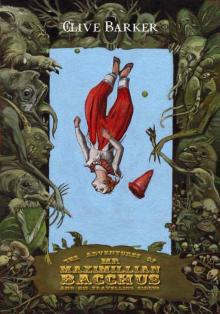 The Adventures of Mr. Maximillian Bacchus and His Travelling Circus
The Adventures of Mr. Maximillian Bacchus and His Travelling Circus Everville
Everville Books of Blood: Volume Three
Books of Blood: Volume Three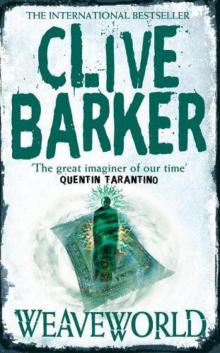 Weaveworld
Weaveworld The Scarlet Gospels
The Scarlet Gospels Sacrament
Sacrament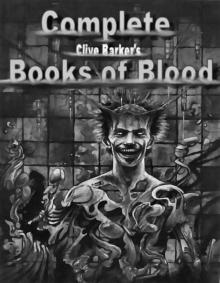 Books of Blood: Volumes 1-6
Books of Blood: Volumes 1-6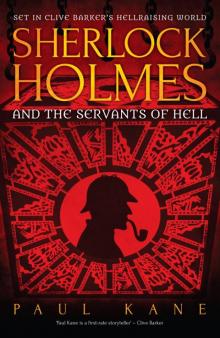 Sherlock Holmes and the Servants of Hell
Sherlock Holmes and the Servants of Hell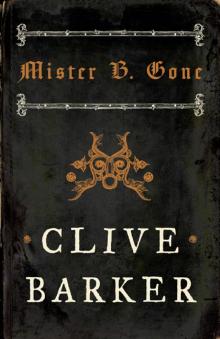 Mister B. Gone
Mister B. Gone Imajica
Imajica The Reconciliation
The Reconciliation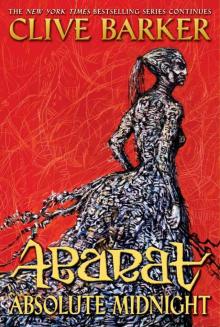 Abarat
Abarat Clive Barker's First Tales
Clive Barker's First Tales The Hellbound Heart
The Hellbound Heart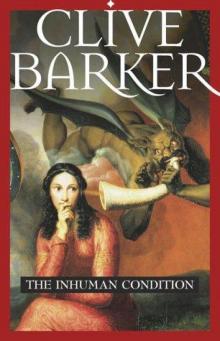 The Inhuman Condition
The Inhuman Condition Infernal Parade
Infernal Parade Days of Magic, Nights of War
Days of Magic, Nights of War The Thief of Always
The Thief of Always Books of Blood Vol 2
Books of Blood Vol 2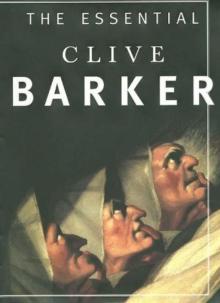 The Essential Clive Barker
The Essential Clive Barker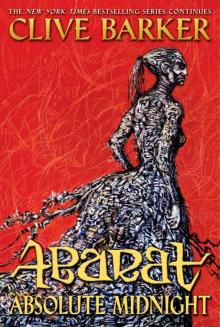 Abarat: Absolute Midnight a-3
Abarat: Absolute Midnight a-3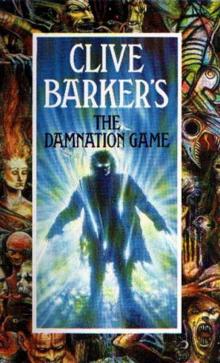 The Damnation Game
The Damnation Game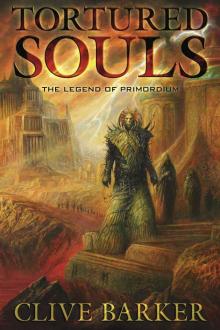 Tortured Souls: The Legend of Primordium
Tortured Souls: The Legend of Primordium Books of Blood Vol 5
Books of Blood Vol 5 Imajica 02 - The Reconciliator
Imajica 02 - The Reconciliator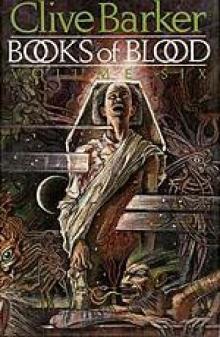 Books Of Blood Vol 6
Books Of Blood Vol 6 Imajica 01 - The Fifth Dominion
Imajica 01 - The Fifth Dominion Abarat: Absolute Midnight
Abarat: Absolute Midnight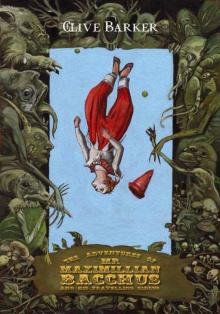 The Adventures of Mr. Maximillian Bacchus & His Traveling Circus
The Adventures of Mr. Maximillian Bacchus & His Traveling Circus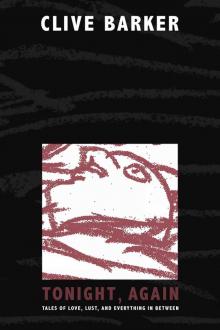 Tonight, Again
Tonight, Again Abarat: The First Book of Hours a-1
Abarat: The First Book of Hours a-1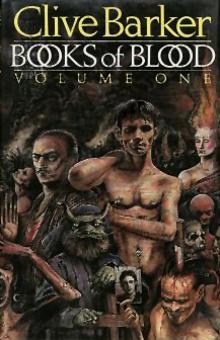 Books Of Blood Vol 1
Books Of Blood Vol 1 Age of Desire
Age of Desire Imajica: Annotated Edition
Imajica: Annotated Edition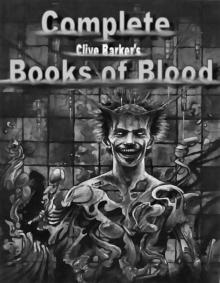 Complete Books of Blood
Complete Books of Blood Gutted: Beautiful Horror Stories
Gutted: Beautiful Horror Stories Shivers 7
Shivers 7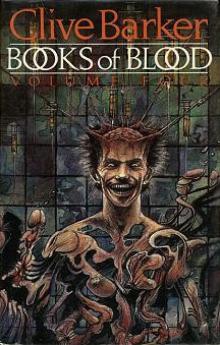 Books Of Blood Vol 4
Books Of Blood Vol 4